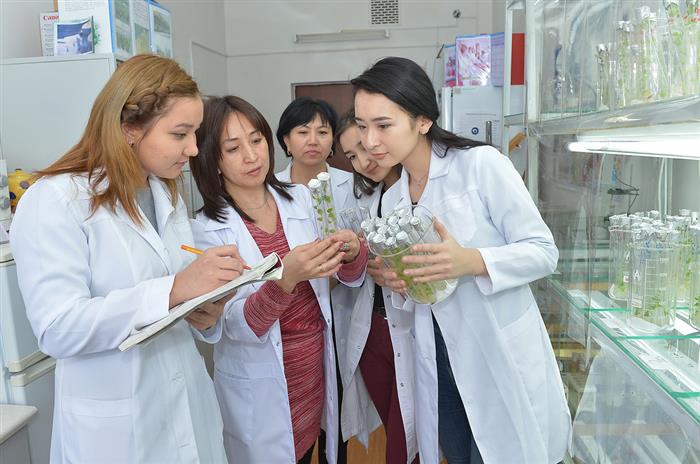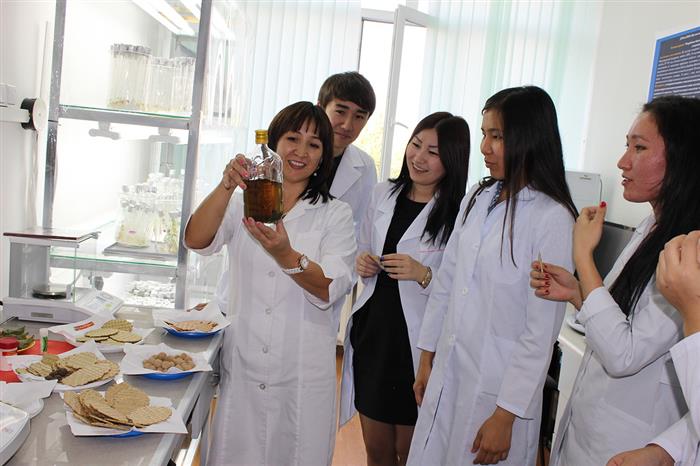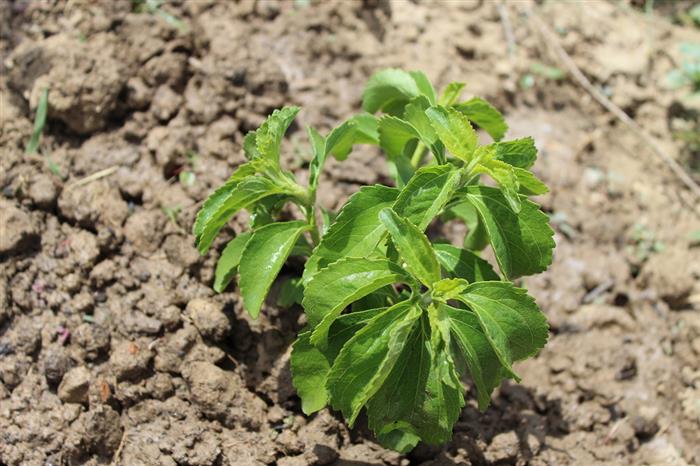- Main page
- News
PRODUCT OF "REVOLUTION" IN THE SWEET MARKET
2/10/2022
Today, according to the International Diabetes Federation, 463 million people worldwide suffer from diabetes. The COVID-19 epidemic has caused irreparable damage to health care due to the prevalence of diabetes (SD) and obesity. This is because the flow of infection increases in patients with this disease.
Scientific data collected during the pandemic showed that patients with diabetes and obesity should pay more attention to the prevention of COVID-19. A raw material component such as stevia plays an important role in the production of functional foods. Its use in the food industry allows you to partially replace sugar, which is very important to solve the problem of proper nutrition.

Specialists of the Laboratory of Plant Biotechnology of Al-Farabi Kazakh National University implemented a research project on "Development of biotechnology for the mass reproduction of stevia - a natural substitute for sugar for implementation in the industrial sector of the Republic of Kazakhstan." According to the project leader - Candidate of Biological Sciences, Associate Professor Saltanat Asrandina, stevia (Stevia rebaudiana Bertoni) is a perennial, thermophilic, herbaceous plant. It is endemic to Brazil and Paraguay.
- Glycosides (DG) are synthesized in the leaves of stevia, the aglycon of which is steviol. These compounds are about 300 times sweeter than sucrose. They are low in calories, do not have toxic and mutagenic effects. It is practically not absorbed into the human body. DG is very effective as a sweetener for people suffering from disorders of carbohydrate metabolism, especially for people with diabetes, because they have hypoglycemic properties, - says the project manager.

According to Saltanat Shyntayevna, the main advantages of dieter glycosides are: sweet taste, zero energy content, resistance to heating, storage and freezing, as well as acids and alkalis, soluble, low consumption, no harmful effects with long-term use and participation in the metabolic process does not require insulin.
Stevia components have sugar-substituting properties in the diet of people with metabolic disorders, including diabetes, atherosclerosis, obesity and other concomitant diseases.

Stevia has a positive effect on the function of the liver and pancreas, eliminates allergic diathesis in children, improves sleep, increases physical and mental abilities. Stevioside prevents the formation of ulcers in the gastrointestinal tract (GIT). Acetylsalicylic acid, butadione and other anti-inflammatory drugs taken with stevia do not adversely affect the walls of the gastrointestinal tract. Numerous studies have shown that regular use of stevia lowers blood sugar, radionuclides and cholesterol, improves cell regeneration, inhibits tumor growth, strengthens blood vessels, and has choleretic, anti-inflammatory and diuretic effects.
There is no age limit on the use of dieter glycosides. Therefore, they can be used for medical nutrition for children and adults. Also, due to the properties described above, stevia is used in the food industry, ie in the technological processes of cooking, canning vegetables, fruits and meat, and in cosmetology.
Transparency Market Research recently conducted a study of the sweeteners market for 2020-2030. It provides a comprehensive analysis of the industry and its potential. As a result, the global market of sweeteners is projected to reach $ 489 billion in 2020. The market is projected to reach $ 731 billion by 2030, with the sector growing at an annual rate of 4%. The use of stevia, syrup, honey, palm sugar, coconut sugar and other plant-based sweeteners in beverages and packaged foods will be available on the market in areas where these plants grow. And it will help it to enter the world market.
Stevia is one of the most promising intensive sweeteners in the world. It can eliminate carcinogens and food additives that are dangerous to health, as well as synthetic and high-calorie sweeteners that are banned in developed countries such as Europe, the United States, Japan and Canada.
In 2011, stevia was officially adopted by the European Union as a dietary supplement. Since then, new products based on stevia have attracted consumers in European countries. For example, Coca-Cola, the world's largest producer of soft drinks, uses 30% stevia instead of sugar in French-made Sprite and Nestea products. It was the first major company to introduce stevia after its official approval by the European Commission (EC). It also allowed Coca-Cola to take advantage of innovative opportunities and launch new beverages.
In recent years, the level of stevia consumption in the global food market has increased significantly. The "sweet" plant is rapidly gaining popularity on the world stage, conquering the beverage and food industries.
Every year, Mintel launches about 450 new products using stevia. According to Grand View Research, the global stevia market will reach $ 556.7 million by 2024. As for us, in 1996 the staff of the Institute of Plant Physiology, Genetics and Bioengineering in the country began work on the development of reproductive biotechnology and the acquisition of planting material.
From 2012 to 2014, the staff of the Laboratory of Plant Biotechnology of KazNU implemented a research project in this area.
- As a result of the study, we selected and modified the methods of microclonal propagation of stevia in vitro culture. The effect of new synthetic growth regulators on the physiological and biochemical parameters of stevia was studied. Methods of adaptation of regenerants in the open have been optimized.
The patterns of accumulation and distribution of stevioside in plants grown in the field and the amount of glycosides, pigments, proteins, carbohydrates, vitamins and minerals were determined. The biological activity of extracts from stevia leaves was assessed for the growth and development of bacteria, - says Saltanat Shyntayevna. According to the project manager, the biological activity of stevia extracts on physiological and biochemical parameters was studied. This determines the resistance of wheat and corn to pathogens in laboratory and field conditions.
- On the basis of experimental fields of the Agrobiological Station of the Kazakh National University, stevia products (leaves) were grown and harvested. Concepts, technological instructions and recipes for several types of flour confectionery have been developed, replacing granulated sugar with powder from stevia leaves. These include pastilles, "crisp bread", Bionan - "Minus appetite", "Plus stevia" therapeutic and prophylactic balm, "Plus stevia" probiotic bread, "Kurt plus stevia" plant-dairy products. Scientific articles and theses were published within the project. Five innovation patents have been obtained, - says Saltanat Asrandina.
It is no secret that the number of people with diabetes has recently increased. Kazakhstan's environmental problems also have a negative impact on the health of the population. And many are unaware of the new, natural source of stevia, which is leading to significant changes in nutrition. Mass production of stevia-containing medicinal products has not yet been established in Kazakhstan. Due to the lack of domestic raw materials, our industry is focused on imported stevia. The main competitors are foreign companies such as the United States, China and Russia. The cost of food products with natural sugar substitutes is high for domestic consumers.
The lack of stevia varieties adapted to the conditions of Kazakhstan will undoubtedly delay the spread of this crop in the region and its introduction into agricultural production. Therefore, now is the time to provide the population of the republic with such food.
In this regard, today the staff of the Laboratory of Plant Biotechnology continues to work on the development of technology for the production of stevia for localization in the southern regions of Kazakhstan. Also, KazNU specialists together with scientists from Almaty Technological University are conducting research on the development of technology for the preparation of functional "new generation" food products enriched with high nutritional value and therapeutic and prophylactic stevia.
For this purpose, the development of food processing technology will be aimed at improving the health of the population. It will also ensure food security and make a significant contribution to solving problems in this area.
KAMILA DUYSEN


